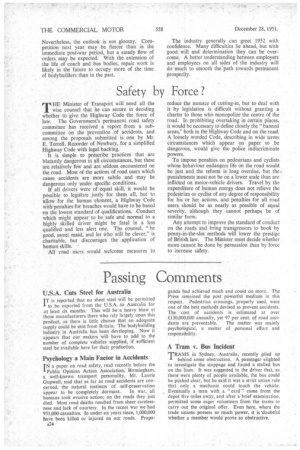Safety by Force ?
Page 26

If you've noticed an error in this article please click here to report it so we can fix it.
THE Minister of Transport will need all the wise counsel that he can secure in deciding whether to give the Highway Code the force of law. The Government's permanent road safety committee has received a report from a subcommittee on the prevention of accidents, and among the proposals submitted is one by Mr. E. Terrell. Recorder of Newbury, for a simplified Highway Code with legal backing. It is simple to prescribe practices that are blatantly dangerous in all circumstances, but these are relatively few and are seldom encountered on the road. Most of the actions of road users which cause accidents are more subtle and may be dangerous only under specific conditions.
If all drivers were of equal skill, it would be possible to legislate justly for them all, but to allow for the human element, a Highway Code with penalties for breaches would have to be based on the lowest standard of qualifications. Conduct which might appear to be safe and normal to a highly skilled driver might be fatal in a less qualified and less alert one. The counsel, "be good, sweet maid, and let who will be clever," is charitable, but discourages the application of human skills.
All road users would welcome measures to reduce the menace of cutting-in, but to deal with it by legislation is difficult without granting a charter to those who monopolize the centre of the road. In prohibiting overtaking in certain places, it would be necessary to define closely the "banned areas,' both in the Highway Code and on the road. A loosely worded Code, describing in wide terms circumstances which appear on paper to be dangerous, would give the police indiscriminate powers.
To impose penalties on pedestrians and cyclists whose behaviour endangers life on the road would be just and the reform is long overdue, but the. punishments must not be on a lower scale than are inflicted on motor-vehicle drivers. Travel by the expenditure of human energy does not relieve the pedestrian or cyclist of any degree of responsibility for his or her actions, and penalties for all road users should be as nearly as possible of equal severity. although they cannot perhaps be of similar form.
Any attempt to improve the standard of conduct on the roads and bring transgressors to book by penny-in-the-slot methods will lower the prestige of British law. The Minister must decide whether more cannot be done by persuasion than by force to increase safety.












































































